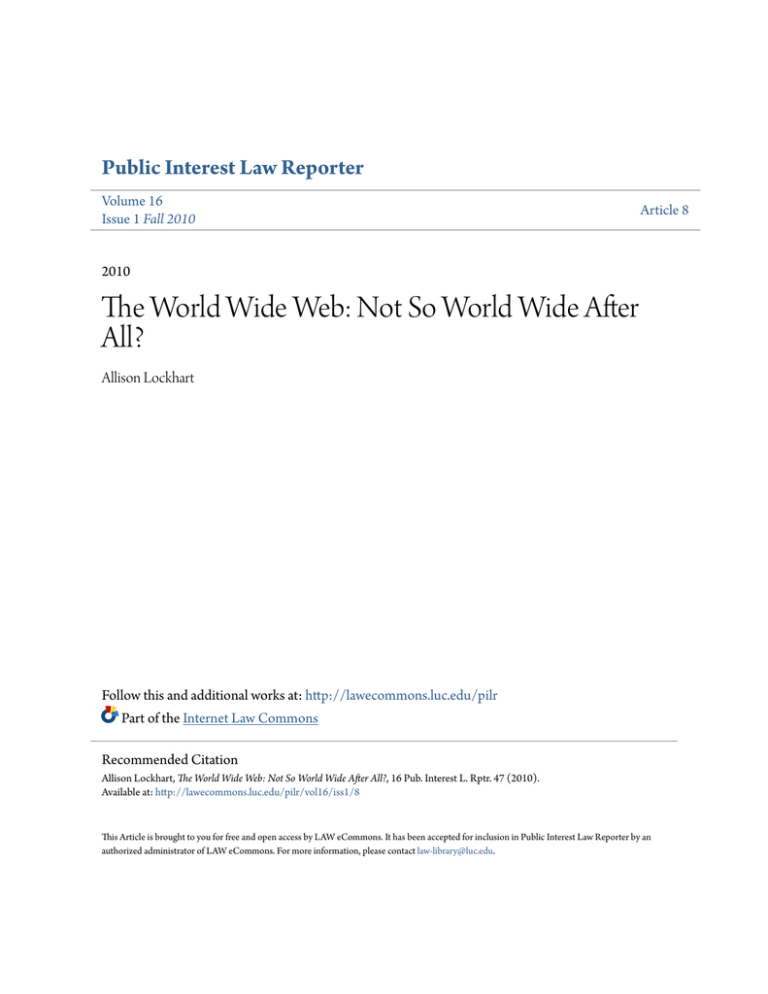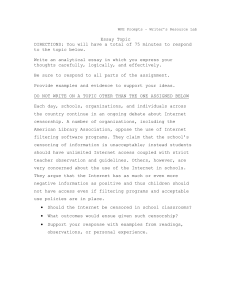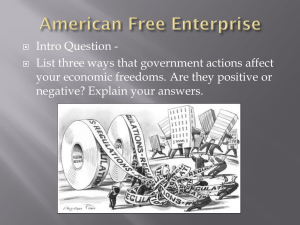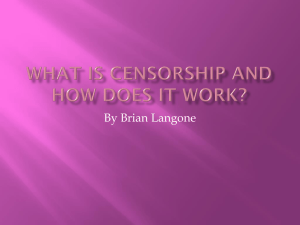The World Wide Web: Not So World Wide After All?
advertisement

Public Interest Law Reporter Volume 16 Issue 1 Fall 2010 Article 8 2010 The World Wide Web: Not So World Wide After All? Allison Lockhart Follow this and additional works at: http://lawecommons.luc.edu/pilr Part of the Internet Law Commons Recommended Citation Allison Lockhart, The World Wide Web: Not So World Wide After All?, 16 Pub. Interest L. Rptr. 47 (2010). Available at: http://lawecommons.luc.edu/pilr/vol16/iss1/8 This Article is brought to you for free and open access by LAW eCommons. It has been accepted for inclusion in Public Interest Law Reporter by an authorized administrator of LAW eCommons. For more information, please contact law-library@luc.edu. Lockhart: The World Wide Web: Not So World Wide After All? No. 1 • Fall 2010 THE WORLD WIDE WEB: NOT SO WORLD WIDE AFTER ALL? by ALLISON LOCKHART I It’s hard to imagine not having twenty-four hour access to videos of dancing cats or Ashton Kutcher’s hourly musings, but this is the reality in many countries. In an attempt to control what some governments perceive as a lawless medium, China, Saudi Arabia, Cuba, and a growing number of other countries have begun censoring content on the Internet.1 The most common form of censorship involves blocking access to certain websites, but the governments in these countries also employ companies to prevent search results from listing what they deem inappropriate.2 Other governments have successfully censored material on the Internet by simply invoking in the minds of its citizens a fear of punishment or ridicule that encourages selfcensoring.3 47 Published by LAW eCommons, 2010 1 Public Interest Law Reporter, Vol. 16, Iss. 1 [2010], Art. 8 Loyola Public Interest Law Reporter The issue of Internet censorship became highly publicized in early 2010 when Google, one of the world’s most popular search engines, decided to stop voluntarily censoring the Chinese version of its website.4 Google in effect shut down the Chinese website by redirecting users to Google’s uncensored Hong Kong website, creating an ongoing conflict with the Chinese government.5 Due to this dispute, many people know that China censors its citizens’ use of the Internet, but China is not alone.6 Censorship affects more than a quarter of the world’s population, with Iran, Tunisia, and Saudi Arabia joining China as some of the worst offenders.7 While countries like France and Germany ban “race hate websites” to prevent Nazi sympathizers from organizing a modernday movement, the governments of Tunisia and Iran effectively limit freedom of speech by banning all sites that allow photo or video sharing.8 The idea of censoring is not new.9 Numerous countries enacted statutes that limited access to certain websites as soon as the Internet became available within their borders.10 As early as 1994, China enacted laws regulating how citizens used the Internet.11 China’s Ministry of Public Security stated in the Computer Information Network and Internet Security, Protection and Management Regulations that no individual may use the Internet for “spreading rumors,” “destroying the order of society,” or “injuring the reputation of state organs.”12 Saudi Arabian law prohibits Internet users from publishing or accessing “anything contrary to the state or its system,” and further limits advertising and certain economic activity for corporations.13 These types of regulations are not exclusive to China and Saudi Arabia, but are representative of the various methods employed to limit Internet accessibility around the world.14 Despite legal threats and social pressure, many citizens of countries with Internet censorship have found ways to get around the technology blocks. One option is hiring hackers to provide them with illegal access to banned content, such as pornographic or politically controversial websites.15 Another option is using slang words or metaphors or changing a website’s URL every few days to stay ahead of government blocks.16 Recently, the availability of software to get around Internet censorship has made it easier to access blocked websites that governments consider inappropriate.17 Users can download tools such as virtual private networks (VPNs), proxy servers, and other software that can breach firewalls that block certain content.18 A VPN gives users access to servers in a country without Internet censoring, and it encrypts information that identifies the user.19 This allows the user to pri- 48 http://lawecommons.luc.edu/pilr/vol16/iss1/8 2 Lockhart: The World Wide Web: Not So World Wide After All? No. 1 • Fall 2010 vately search the Internet under an anonymous computer address.20 A proxy server essentially gives the user access to the Internet on another, unblocked, computer.21 By simply downloading these free or relatively inexpensive programs to his or her computer, a user in Tunisia, Egypt, or anywhere else in the world with Internet censorship, can access the Internet with almost complete freedom.22 But these methods of circumventing Internet censorship don’t come without risks.23 Internet police in China, for example, are aware of proxy servers and VPNs.24 The Chinese government is constantly monitoring Internet activity in its country, and once it is aware of a particular anti-censoring product or service, the government won’t hesitate to shut it down temporarily or permanently.25 Additionally, punishments for users of these products range from a 30-minute government-imposed “time out” on Internet usage to financial ruin or even time in prison.26 When one VPN or proxy server is shut down, users are forced to switch to another; it is a constant struggle to gain access to blocked websites.27 But people around the world are fighting for the right to Internet freedom for citizens of censored countries.28 Reporters Without Borders, a Paris-based organization that promotes global freedom of the press, funds technology that allows citizens of foreign countries to access the Internet anonymously.29 Its main goal is to help journalists, bloggers, and human rights activists who risk imprisonment in their own countries by commenting on government actions.30 Another group is the OpenNet Initiative, an educational partnership that studies the effect that censoring has on different aspects of the global economy.31 Its goal is to investigate Internet censoring practices to determine what the actual, unintended consequences are so that it can help Internet freedom advocates work more effectively.32 The United States government has also joined the effort by approving the allocation of millions of dollars for development of anti-filtering and anti-censoring technology.33 The State Department is currently working with over 40 countries to provide individuals with complete access to the Internet.34 It might seem strange to some that so many people around the world are becoming involved in this fight for Internet freedom. Do these censored citizens even know what they are missing? James Walsh, a law student who traveled to China in June 2010 with Loyola University Chicago’s study abroad program, said that he “got the feeling that [Chinese citizens] didn’t really care 49 Published by LAW eCommons, 2010 3 Public Interest Law Reporter, Vol. 16, Iss. 1 [2010], Art. 8 Loyola Public Interest Law Reporter about the censorship.”35 And while he did admit his frustration with the censoring of popular websites like Facebook and Wikipedia, he stated, “I was prepared for [censoring], so it didn’t really bother me.”36 Is it necessary then to fund the creation of software that will give censored citizens access to Facebook? During her January 2010 remarks on Internet freedom at the Newseum museum in Washington, D.C., Secretary of State Hilary Clinton stressed the importance of allowing citizens to connect with their global counterparts.37 “The largest public response to the terrorist attacks in Mumbai was launched by a 13-year-old boy,” she said.38 “He used social networks to organize blood drives and a massive interfaith book of condolence. . . . And in Mexico, a single email from a private citizen who was fed up with drug-related violence snowballed into huge demonstrations in all of the country’s 32 states,” she stated.39 This address emphasized that Internet censorship isn’t all about blocking pornographic websites in ultra-conservative countries. As President Barack Obama stated in November 2009, during a town hall meeting in Shanghai, China, “I think that the more freely information flows, the stronger the society becomes, because then citizens of countries around the world can hold their own governments accountable. They can begin to think for themselves. That generates new ideas. It encourages creativity.”40 While there is much progress being made to bring Internet freedom to citizens around the globe, organizations like OpenNet Initiative and Reporters Without Borders believe there is still more work to do for communication on a global level to be realized.41 NOTES 1 About Filtering, OPENNET INITIATIVE, HTTP://OPENNET.NET/ABOUT-FILTERING (LAST VISITED OCT. 21, 2010). 2 Id. 3 Id. 4 China Condemns Decision by Google to Lift Censorship BBC NEWS, Mar. 23, 2010, available at http://news.bbc.co.uk/2/hi/8582233.stm. 5 Id. 6 Google ‘may pull out of China after Gmail cyber attack,’ BBC NEWS, Jan. 13, 2010, available at http://news.bbc.co.uk/2/hi/8455712.stm. 7 Antonio Lupetti, Internet Censorship Report, WOORKUP.COM, June 27, 2010, available at http://woorkup.com/2010/06/27/internet-censorship-report/. 50 http://lawecommons.luc.edu/pilr/vol16/iss1/8 4 Lockhart: The World Wide Web: Not So World Wide After All? No. 1 • Fall 2010 8 Internet Censorship: Law and Policy Around the World, ELECTRONIC FRONTIERS AUSTRALIA, Mar. 28, 2002, http://www.efa.org.au/Issues/Censor/cens3.html#sau.; Nico Hines, YouTube banned in Turkey after video insults, THE TIMES ONLINE, Mar. 7, 2007, available at http://www. timesonline.co.uk/tol/news/world/europe/article1483840.ece. 9 Freedom of Expression and the Internet in China, HUMAN RIGHTS WATCH, http://www.hrw. org/backgrounder/asia/china-bck-0701.htm (last visited Oct. 21, 2010). 10 Id. 11 Id. 12 Id. 13 Saudi Internet Rules, 2001, AL-BAB, http://www.al-bab.com/media/docs/saudi.htm (last visited Oct. 21, 2010). 14 Electronic Frontiers Australia, supra note 8. 15 Saudis Pay to Surf Censored Sites, BBC NEWS, Nov. 3, 2001, available at http://news.bbc. co.uk/2/hi/middle_east/1636789.stm. 16 Li Jing and Zhou Ping, Chinese Netizens Use Word Play to Battle Censors, THE EPOCH TIMES, Aug. 30, 2010, available at http://www.theepochtimes.com/n2/content/view/41719/. 17 Lara Farrar, Cashing In on Internet Censorship, CNN.COM, Feb. 18, 2010, available at http://articles.cnn.com/2010-02-18/tech/internet.censorship.business_1_internet-censorshipgoogle-popular-social-networking-sites?_s=PM:TECH. 18 Id. 19 Id. 20 Id. 21 Id. 22 Id. 23 Id. 24 Id. 25 Id. 26 James Fallows, “The Connection Has Been Reset,” THE ATLANTIC, Mar. 2008, available at http://www.theatlantic.com/magazine/archive/2008/03/-ldquo-the-connection-has-been-resetrdquo/6650/. 27 Farrar, supra note 17. 28 Reporters Without Borders Unveils First-Ever “Anti-Censorship Shelter,” REPORTERS WITHOUT BORDERS, Jun. 25, 2010, http://en.rsf.org/reporters-without-borders-unveils-25-06-2010, 37809.html. 29 Id. 30 Id. 31 About ONI, OPENNET INITIATIVE, http://opennet.net/about-oni (last visited Oct. 21, 2010). 32 Id. 33 Eli Lake, Senate OKs funds to thwart Iran Web censors, WASH. TIMES, Jul. 26, 2009, available at http://www.washingtontimes.com/news/2009/jul/26/senate-oks-funds-to-help-thwartiran-web-censors/?page=2&source=newsletter_must-read-stories-today_more_news_carousel. 34 Hilary Clinton, Sec’y of State, Remarks on Internet Freedom at The Newseum in Washington, D.C., Jan. 21, 2010, available at http://www.state.gov/secretary/rm/2010/01/135519.htm. 35 Interview with James Walsh, law student, Loyola University Chicago School of Law, in Chi., Ill. (Oct. 4, 2010). 36 Id. 37 Clinton, supra note 34. 38 Id. 51 Published by LAW eCommons, 2010 5 Public Interest Law Reporter, Vol. 16, Iss. 1 [2010], Art. 8 Loyola Public Interest Law Reporter 39 Id. 40 Barack Obama, President of the U.S. Address at Town Hall Meeting in Shanghai, China, Nov. 16, 2009, available at http://www.cbsnews.com/stories/2009/11/16/politics/main56709 03.shtml. 41 ONI, supra note 31. 52 http://lawecommons.luc.edu/pilr/vol16/iss1/8 6




